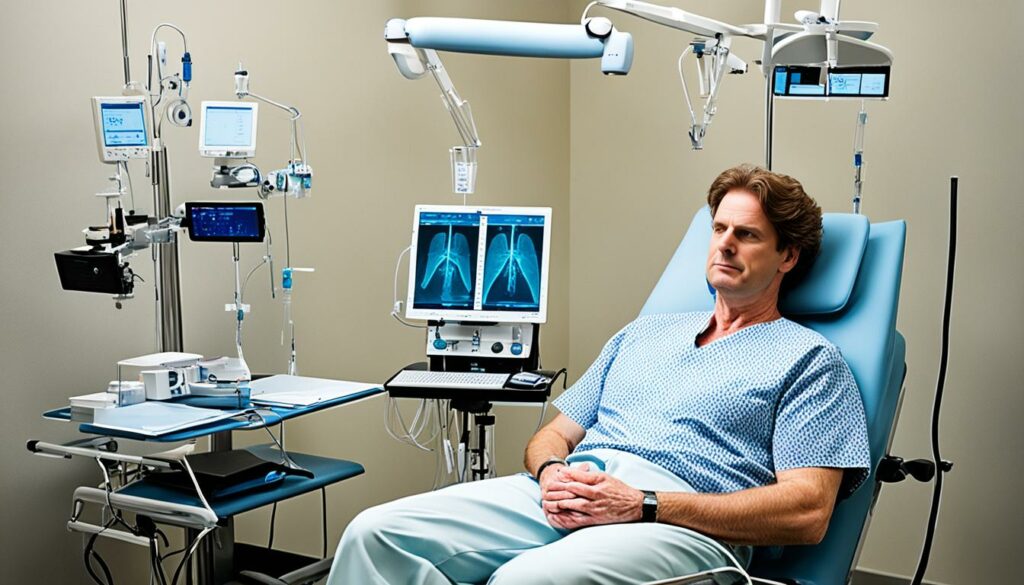Did you know that approximately 9.4% of children in the United States have been diagnosed with ADHD? With such a significant number of individuals affected by this condition, understanding the testing process becomes crucial in ensuring accurate diagnosis and appropriate treatment.
Testing for ADHD involves a series of assessments and evaluations to determine the presence of symptoms and rule out other potential causes. It is important to note that there is no single test that can definitively diagnose ADHD. Instead, healthcare professionals rely on a combination of physical exams, behavioral testing, and questionnaires to gather comprehensive information and make an accurate diagnosis.
In this article, we will explore the different steps involved in ADHD evaluation, the importance of screening, and what to expect during the process. Whether you are seeking an evaluation for yourself or a loved one, understanding the testing process can help alleviate any anxieties and ensure a smoother experience.
Key Takeaways:
- ADHD affects approximately 9.4% of children in the United States.
- Testing for ADHD involves a combination of physical exams, behavioral testing, and questionnaires.
- There is no single test that can definitively diagnose ADHD.
- ADHD screening is important in identifying and managing symptoms.
- An individualized approach is taken to customize the ADHD screening process.
The Importance of ADHD Screening
ADHD screening plays a vital role in identifying children and adults with ADHD, allowing them to receive appropriate treatment for this neurodevelopmental disorder. The benefits of ADHD screening are significant, as it enables individuals to manage their symptoms effectively and improve their daily functioning.
Screening for ADHD involves a comprehensive evaluation that may include medical assessments, interviews, questionnaires, and behavioral tests. This thorough screening process helps healthcare professionals accurately diagnose ADHD and differentiate it from other conditions that may present similar symptoms.
Once an individual receives a formal ADHD diagnosis through screening, they can seek suitable treatment options tailored to their specific needs. Treatment for ADHD may include a combination of medication, behavioral therapy, and implementing lifestyle changes. With the right treatment, individuals can experience a reduction in ADHD-related challenges, allowing them to thrive and pursue their personal and professional goals.
“ADHD screening is an essential step in identifying and diagnosing this common neurological disorder. It provides individuals with the opportunity to access appropriate treatment, manage symptoms effectively, and improve their overall quality of life.”
Benefits of ADHD Screening
The benefits of ADHD screening extend beyond the initial diagnosis. By identifying ADHD early on, individuals can begin receiving treatment and support that can significantly improve their quality of life. Some of the key benefits of ADHD screening include:
- Improved symptom management: ADHD screening allows individuals to address their symptoms proactively, leading to better symptom control and enhanced daily functioning.
- Access to appropriate treatment: A formal ADHD diagnosis through screening opens the door to tailored treatment options, including medication, therapy, and behavioral interventions.
- Better academic and occupational performance: With the right treatment and support, individuals with ADHD can optimize their performance at school or work and overcome challenges related to attention, impulsivity, and hyperactivity.
- Enhanced personal relationships: By understanding and managing their ADHD symptoms, individuals can foster healthier relationships with family, friends, and colleagues.
- Empowerment and self-understanding: ADHD screening provides individuals with a deeper understanding of their challenges and strengths, empowering them to make informed decisions about their well-being.
Seeking Suitable Treatment for ADHD
ADHD screening is just the first step towards obtaining appropriate treatment for this complex disorder. Once individuals receive an ADHD diagnosis, they can work closely with healthcare professionals to create a comprehensive treatment plan that aligns with their needs and goals.
Effective treatment strategies for ADHD may include:
| Treatment Options | Description |
|---|---|
| Medication | Prescribed medications can help manage symptoms and improve attention, impulse control, and hyperactivity. |
| Behavioral Therapy | Therapeutic approaches like cognitive-behavioral therapy (CBT) can provide individuals with coping strategies, organizational skills, and behavior management techniques. |
| Lifestyle Modifications | Introducing healthy lifestyle changes, such as regular exercise, a balanced diet, and proper sleep, can support overall well-being and symptom management. |
It is essential for individuals with ADHD to participate actively in their treatment journey, collaborate with healthcare professionals, and engage in ongoing monitoring and follow-up appointments.
By recognizing the importance of ADHD screening and seeking suitable treatment, individuals can effectively manage their symptoms, unlock their potential, and lead fulfilling lives.
How Does ADHD Screening Work?
The ADHD screening process is a comprehensive evaluation that follows the guidelines outlined in the DSM-5-TR™ (Diagnostic and Statistical Manual of Mental Disorders, 5th Edition, Text Revision). It involves a series of steps to determine the presence of ADHD symptoms, rule out alternative causes, and identify any comorbidities.
Firstly, the screening process begins with a medical or neurodevelopmental examination. This examination helps identify any physical or neurological factors that may be contributing to the symptoms. It also helps rule out other conditions or disorders that may have symptoms similar to ADHD.
The next step in the screening process involves recording symptoms using rating scales. These rating scales, such as the ADHD rating scales mentioned in Section 1, provide a standardized method to assess and quantify ADHD symptoms. They help healthcare professionals gather information about the severity and frequency of specific symptoms.
“ADHD screening involves a combination of medical exams, rating scales, interviews, and possibly psychological or behavioral tests.”
Interviews play a vital role in the ADHD screening process. Healthcare professionals often interview the individual being screened, as well as their parents, guardians, teachers, and other caregivers. These interviews provide valuable insights into the individual’s behavior in different settings, helping to confirm the presence of ADHD symptoms.
In some cases, psychological or behavioral tests may be administered as part of the screening process. These tests help assess cognitive abilities, executive functions, and other aspects of mental health. They can provide additional information to support the diagnosis of ADHD.
The overall goal of the ADHD screening process is to differentiate ADHD symptoms from other conditions such as anxiety, depression, learning disabilities, and autism. The process helps healthcare professionals identify the underlying cause of symptoms, ensuring an accurate diagnosis and appropriate treatment.
Alternative Causes of ADHD Symptoms
It’s important to note that not all individuals with ADHD-like symptoms have ADHD. There can be alternative causes that contribute to similar symptoms. During the screening process, healthcare professionals thoroughly assess and rule out these alternative causes.
Some alternative causes of ADHD-like symptoms may include:
- Anxiety disorders
- Depression
- Learning disabilities
- Autism spectrum disorder
- Psychological trauma
By ruling out these alternative causes, healthcare professionals can ensure an accurate diagnosis and appropriate treatment plan for individuals experiencing ADHD symptoms.
What to Expect During an ADHD Screening
During an ADHD screening, individuals can expect a thorough evaluation process that encompasses various steps to gather comprehensive information for an accurate diagnosis. The screening aims to not only identify ADHD symptoms but also rule out any other potential conditions and determine the best course of treatment. The evaluation typically involves:
- Interviews: Healthcare professionals will conduct interviews to gather information about the individual’s behavior, symptoms, and medical history. This step helps in understanding the individual’s experiences and provides valuable insight into their ADHD symptoms.
- Questionnaires: Individuals may be asked to complete questionnaires or rating scales designed to assess ADHD symptoms. These assessments help in evaluating the severity of symptoms and their impact on various areas of life, such as school or work performance.
- Physical Exam: In some cases, a physical exam may be performed to rule out any underlying medical conditions that could be contributing to the symptoms. This exam ensures that any physical health factors are considered during the evaluation process.
- Child Observation: When evaluating children, input from family members, teachers, and other caregivers may be requested to gain a comprehensive understanding of the child’s behavior across different settings. This observation helps in assessing how ADHD symptoms manifest and impact the child’s daily life.
This multifaceted approach allows healthcare professionals to gather a wide range of information and consider different perspectives to make an accurate diagnosis. By conducting interviews, questionnaires, physical exams, and child observations, the screening process ensures a holistic evaluation of ADHD symptoms.

This image provides a visual representation of the collaborative nature of an ADHD screening, illustrating the steps involved in evaluating symptoms and making informed diagnoses.
Customizing ADHD Screening
While healthcare providers follow standardized guidelines for ADHD screening, they understand the importance of individualized approaches to identify and understand the unique symptoms experienced by each individual. By customizing the screening process, healthcare professionals can focus on determining the cause of symptoms and differentiating ADHD from other conditions that may present similar symptoms.
This individualized ADHD screening approach allows for a more accurate diagnosis and ensures that the appropriate treatment options are recommended.
“Every individual is different, and their ADHD symptoms may manifest in various ways. By tailoring the screening process to each person’s distinct symptoms, we can develop a comprehensive understanding of their condition.”
During an individualized ADHD screening, healthcare providers may use additional assessments, interview techniques, or specialized questionnaires to uncover specific nuances related to the individual’s symptoms and experiences. This approach helps identify any potential underlying causes that may contribute to these symptoms.
Determining the Cause of Symptoms
By focusing on individualized screening, healthcare providers can better determine the cause of ADHD symptoms and ensure an accurate diagnosis. This is crucial in ruling out other conditions that may mimic ADHD symptoms but require different treatment approaches.
For example, a person experiencing difficulties with attention and impulsivity may exhibit these symptoms due to anxiety rather than ADHD. Through an individualized ADHD screening process, healthcare professionals can differentiate between the two and provide targeted interventions.
Appropriate Treatment and Support
By customizing the ADHD screening process, healthcare providers can offer personalized treatment plans that address the unique needs of each individual. This ensures that the treatment approach aligns with the specific symptoms and challenges faced by the person seeking help.
Individualized ADHD screening not only helps determine the appropriate treatment but also provides individuals with the support and resources they need to manage their symptoms effectively.

Through individualized ADHD screening, healthcare providers can gain a comprehensive understanding of a person’s symptoms, identify the cause of those symptoms, and tailor treatment plans accordingly. This customized approach is essential in providing accurate diagnoses and facilitating improved outcomes for individuals with ADHD.
Duration and Preparation for ADHD Evaluation
The duration of an ADHD evaluation can vary depending on the complexity of the case and the age of the individual being evaluated. On average, the evaluation process can take anywhere from one to three hours. It is important to note that the evaluation may require multiple visits to ensure a comprehensive assessment.
When preparing for an ADHD screening, it is recommended that individuals come prepared with relevant information. This includes:
- A list of current medications
- A detailed medical history, including any previous diagnoses or treatments
- Any questions or concerns regarding ADHD or the evaluation process
Gathering information about school or work performance can also be beneficial in providing a comprehensive view of the individual’s functioning. This may include academic or work performance records, teacher or employer feedback, and examples of challenges experienced in these settings.

What Happens After an ADHD Evaluation?
Once an ADHD evaluation is complete, the next steps depend on the outcome of the assessment. If a diagnosis of ADHD is confirmed, appropriate treatment options will be discussed to help manage the condition effectively. Medication is one of the commonly prescribed treatments for ADHD, as it can help control symptoms and improve focus.
Follow-up appointments will be scheduled to monitor the progress of the individual and make any necessary adjustments to the treatment plan. These appointments are important to ensure that the chosen medication is working effectively and to address any concerns or side effects that may arise.
If ADHD is ruled out as the primary cause of the symptoms, further tests and evaluations may be recommended to determine the underlying cause. This is crucial to ensure an accurate diagnosis and appropriate treatment for the individual’s specific condition.
It’s essential to remember that each individual’s journey with ADHD is unique, and treatment plans may vary accordingly. Collaborating closely with healthcare professionals and attending regular follow-up appointments is key to managing ADHD effectively and achieving optimal outcomes.
Treatment for ADHD
Once an ADHD diagnosis is confirmed, the treatment plan may include:
- Medication: The most common medications prescribed for ADHD are stimulants like methylphenidate (Ritalin) and amphetamines (Adderall). These medications help improve focus, attention, and impulse control.
- Behavioral Therapy: This involves working with a therapist or counselor who specializes in ADHD. Behavioral therapy can help individuals develop strategies to manage symptoms, improve organizational skills, and address any co-occurring mental health conditions, such as anxiety or depression.
- Lifestyle Changes: Implementing healthy lifestyle habits like regular exercise, adequate sleep, and a balanced diet can have a positive impact on managing ADHD symptoms.
It’s important to note that medication is not the only option for treating ADHD, and the best approach may involve a combination of different strategies tailored to the individual’s needs.
Follow-up Appointments
Follow-up appointments after an ADHD evaluation play a crucial role in monitoring progress and ensuring the effectiveness of the chosen treatment plan. These appointments allow healthcare professionals to make any necessary adjustments to the medication dosage, address any concerns or side effects, and evaluate the overall impact of the treatment on the individual’s symptoms and daily functioning.
Regular communication between the individual, their caregivers, and the healthcare team is vital to track progress, discuss any challenges, and make any necessary modifications to the treatment plan to optimize results.
Ruling Out Other Conditions
During an ADHD evaluation, healthcare professionals aim to differentiate ADHD symptoms from other conditions that may present similarly. By ruling out other possible causes, an accurate diagnosis can be made. This process helps ensure that individuals receive appropriate treatment for their specific condition.
Common conditions that may be ruled out during the evaluation process include:
- Anxiety disorders
- Depression
- Learning disabilities
- Autism spectrum disorders
By exploring and ruling out other potential causes, healthcare professionals can provide targeted treatment and support to individuals with ADHD, improving their overall well-being and quality of life.

Conclusion
ADHD screening is a critical part of the diagnostic process for individuals suspected of having ADHD. Although there is no single definitive test for ADHD, the screening process involves a comprehensive evaluation that includes interviews, questionnaires, physical exams, and observations. By utilizing these methods, healthcare professionals aim to differentiate ADHD symptoms from other conditions and provide the necessary treatment and support.
If you suspect that you or a loved one may have ADHD, it is essential to consult with a qualified healthcare professional for a comprehensive evaluation. This evaluation will not only help determine if ADHD is present but also guide the development of an appropriate treatment plan tailored to meet the individual’s specific needs. Treatment options may include medication, behavioral therapy, and lifestyle modifications that can significantly enhance daily functioning and improve overall quality of life.
Remember, early diagnosis and intervention can lead to better outcomes for individuals with ADHD. By seeking professional help and following the recommended screening and evaluation process, you can take the necessary steps towards understanding and effectively managing ADHD.
